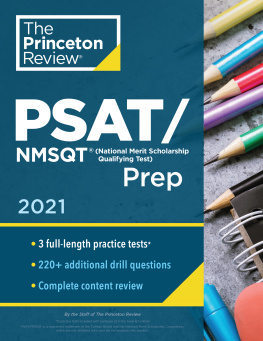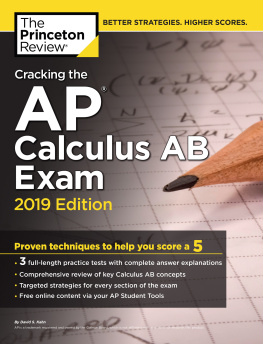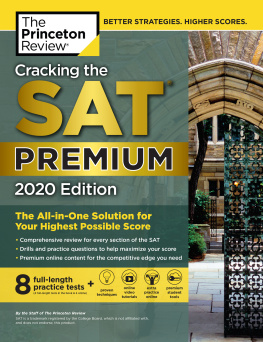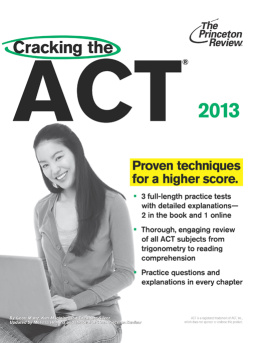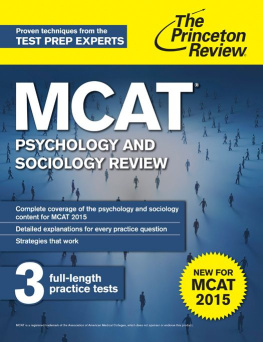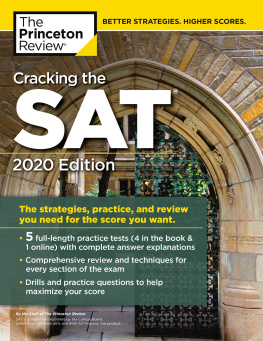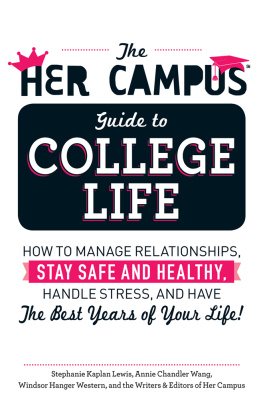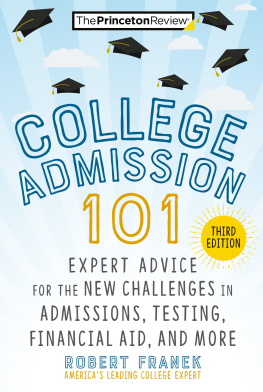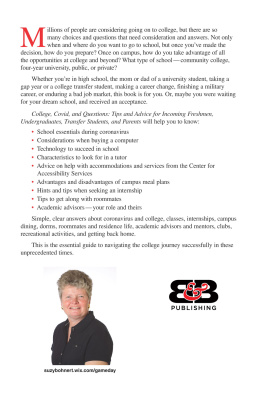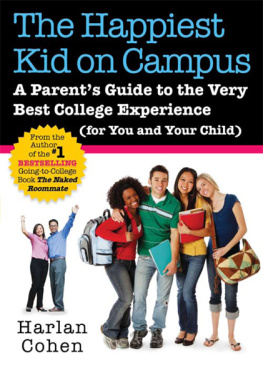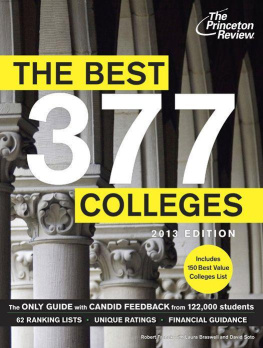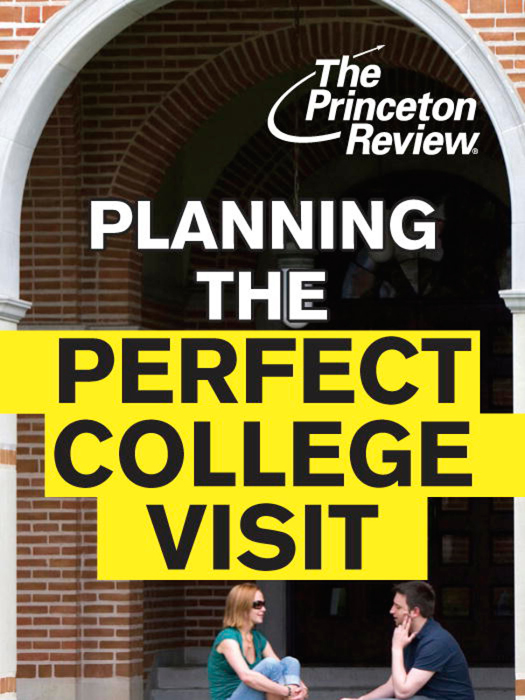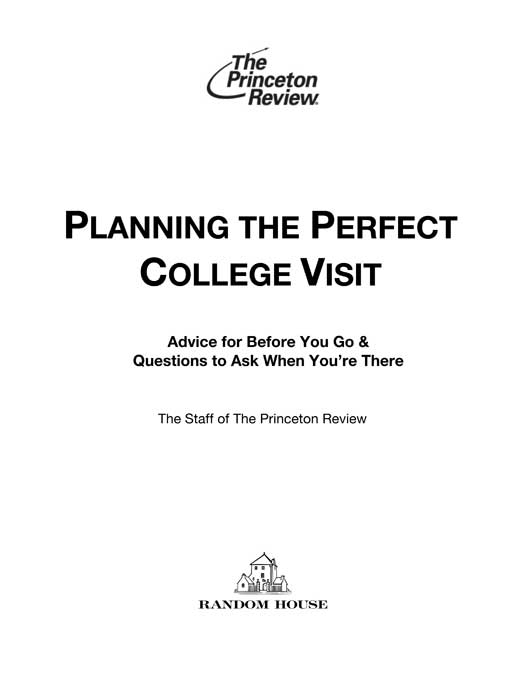If youre reading this ebook, youre probably either embarking on or in the middle of your college search. Youve likely been swamped with information about how to pick a schoolrankings, academic specialties, financial aid, location, et ceteraand your mailbox has been flooded with glossy promotional brochures. These are all great tools for weighing potential schools, but when it comes to researching, theres nothing more useful than an actual college visit.No website, guidebook, or testimonial will give you a better feel for a school than youll get by actually showing up!
This ebook is intended to be a short, helpful guide to planning and getting the most out of your college visits. Inside, youll find information about why a college visit is important, what you should look for while on campus, and what your observations can tell you about the students and culture there.
Youll also find useful information about the logistics of planning a visit, such as when to go, and learn what you should ask when you get there. At the end of the book, we provide a list of the most essential questions you should find answers foryou can use this as an easy, quick reference while youre visiting, or to help jump-start your own question-asking process.
Whether youre considering which colleges to apply to or trying to decide between schools where youre already accepted, a campus tour is a greatin fact, wed say the bestway to get a sense of what life at a school will actually be like for you as a student. Best of luckand have fun!
WHY SHOULD YOU DO A CAMPUS VISIT?
A campus visit wont tell you everything you need to know about life at your prospective college, but it will give you a richer, more detailed view than you would get from surfing websites, browsing brochures, watching videos, or reading college guides. Every school has its own culture, its own unique way of doing things, and you cant divine it from a brochure! And even though you wont learn all there is to know from a brief visit, youll get a sense of thebig picture issues that define life on a campus. Youll probably get enough of a sense of those issues to determine whether the school is a good fit for you.
Spend a weekday on campus while classes are in session and youll get a feel for the rhythm of life there, the attitudes of the students towards their studies, andif you get the chance to attend a few classessome idea of the atmosphere in the schools classrooms. Visit over a weekend and youll experience the schools social life (or lack thereof). Youll also find students relaxing and taking it easy, making it easier to approach them with any questions aboutthe school that you may have.
Lets look at some of the benefits of a campus visit:
1. Youll get a feel for the academic atmosphere and whether its a good fit for you.
Academics are the primary reason youre attending college, so you want to know whether you and the school youre considering are a good academic fit. The quality of the schools academic life and the intensity of student-teacher relationships will strongly impact your experience at college. Look for clues about both during your campus visit.
If possible, attend a class or two during your visit (make sure to arrange for this with the Admissions Office well in advance of your visit). If asked for your preference, request to sit in on a class that is required for all freshmen so that youll get a better sense of what your first year will be likeor, alternatively, try to pick a low-level class within the subject youre planning to major in, if youve already decided that. When youre there, keep youreyes and ears open. Are the classes huge or small? Is the teacher a full professor or a graduate student? Is the class format lecture, lab, discussion, or a hybrid of several formats? Are students contributions to the class interesting? Are students furiously scribbling notes? Are they asking questions? Is Will this be on the test? the only question any of them asks? Answer these questions and youll get a pretty good sense of how students approach their studies at theschool and whether youll be comfortable with that approach.
If you cant attend a class, at least take time to walk around campus and to observe the students and faculty. Pay close attention to students as they travel to and from class. Are they in a hurry? Do they look stressed? Or are they walking at a leisurely pace, conversing, and laughing? Do faculty members talk with students as they walk across campus? Do you even see faculty members walking across campus, or are they missing from the picture? If faculty membersare conspicuously absent, it could mean that they have numerous commitments off campus (e.g., conferences, serving on corporate boards, or teaching at more than one school) that would leave them less time to devote to undergraduates on campus.
2. Youll get a feel for the type of student who attends the school.
For many students, whom they go to school with is just as important as where they go to school and what they study. You may think this is a frivolous concern, but its not; your fellow students will be your peers, friends, competitors, and, in some cases, rivals throughout your tenure at the school. If youre a bad fit with the student body, you could be in for four miserable years (fewer, probably, because most bad fits eventually transfer out; regardless,being the sore thumb at a school is an unpleasant scenario that youll probably want to avoid).
There are lots of different issues to consider as you assess a student body. First, note the degree of similarity among students. Do they all look alike, or is the population diverse? Consider not just racial diversity but also economic diversity, religious diversity, and diversity of personality types. Are you more comfortable surrounded by people just like yourself, or do you want a college that will give you the opportunity to encounter people with differentbackgrounds and perspectives? More specifically, think about:
- Class/Status: Is the parking lot filled with new sports cars and SUVs? Or are most of the cars clunkers (if they are, make sure you havent stumbled onto the faculty parking lot by mistake!)? Do students dress as though they do all their shopping at high-priced, name-brand stores? Do the men and women seem especially fashion-conscious? Are they outfitted in nice but affordable clothing? Are students flashing a lot ofhigh-priced gadgets or the newest, hottest technology? Ask yourself, Can I envision myself a part of this community? For many students, answering this question means having to think about class issues and the social circles they feel the most comfortable navigating.


